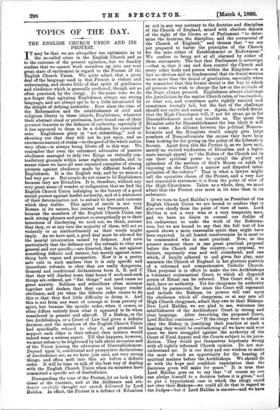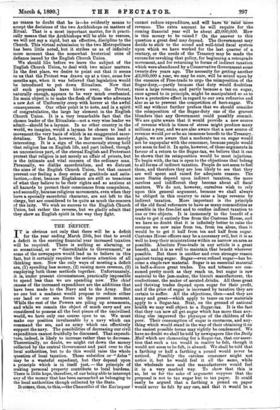TOPICS OF THE DAY.
THE ENGLISH CHURCH UNION AND ITS PROTEST.
IT may be that we are altogether too optimistic as to the so-called crisis in the English Church and as to the outcome of the present agitation, but we frankly confess that we cannot work ourselves up into any very great state of excitement in regard to the Protest of the English Church Union. We quite admit that a great deal of the language used in that Protest is violent and unbecoming, and shows little of that spirit of gentleness and obedience which is generally professed, though not so often practised, by the clergy. At the same time we do not forget that agitating Englishmen always use strong language, and are always apt to be a little intoxicated by the delight of defying authority. Ever since the time of the Reformation and the establishment of civil and religious liberty in these islands, Englishmen, whatever their abstract creed or profession, have found one of their greatest luxuries in the defiance of authority, especially if it has appeared to them to be a defiance for conscience' sake. Englishmen glory in "not submitting," and in shouting out that they will not be put upon, and an enormous amount of steam—to the good of the whole nation very often—is always being blown off in this way. We remember that even the extremest advocates of passive obedience managed to defy two Kings on virtually con- tradictory grounds within some eighteen months, and in recent times we have all seen repeated examples of strong protests against obedience made by different bodies of Englishmen. It is the English way, and by no means a bad way per se. But people do not cease to be Englishmen because they are Ritualists. It is, therefore, without any very great sense of wonder or indignation that we find the English Church Union indulging in the luxury of a good round protest against lawful authority, and of a statement of their determination not to submit to laws and customs which they dislike. This spirit of revolt is not very Roman in its nature, but instead very Protestant. But because the members of the English Church Union use such strong phrases and protest so energetically as to their intentions of disobeying we need not, we think, assume that they, or at any rate the majority of them, will act as violently or as insubordinately as their words might imply. As we have said, a good deal must be allowed for the mental intoxication caused by defiance. And note particularly that the defiance and the refusals to obey are general and not specific,—are directed, that is, not against something definite and instant, but merely against some- thing both vague and prospective. Now it is a pretty safe rule in such matters that it is only specific and immediate refusals to obey that are really dangerous. General and conditional declarations from A, B, and C that they will disobey some time hence if such-and-such things are ordered, are "flat things" and need cause no great anxiety. Soldiers and schoolboys often murmur together and declare that they can no longer render obedience, and yet when the definite order comes to do this or that they find little difficulty in doing it. And this is not from any want of courage or from poverty of spirit, but because the specific order, when it comes, so often differs entirely from what it appeared to be when considered in general and afar-off. If a Bishop, or the two Archbishops, or a Court of Law had given a. definite decision, and the members of the English Church Union had specifically refused to obey it, and promised to support each other in their refusal, then matters would indeed wear a serious aspect. Till that happens, however, we must refuse to be frightened by talk about secession and of the Union joining the advocates of Disestablishment. Depend upon it, conditional and prospective declarations of disobedience are, as we have just said, not very strong things, and often melt into thin air befcre a definite order. It will be time to talk of the beat way of dealing with the English Church Union when its members have committed a specific act of disobedience.
Disregarding the tone of the Protest, let us look a little closer at the contents, and at the deliberate and evi- dently carefully thought out speech delivered by Lord Halifax. In effect, the Protest is a defence of Ritualism as not in any way contrary to the doctrine and discipline of the Church of England, mixed with absolute denials of the right of the Crown or of Parliament "to deter- mine the doctrine, the discipline, and, the ceremonial of the Church of England," and threats that "we are not prepared to barter the principles of the Church for the sake either of Establishment or Endowment." We confess to being not at all alarmed by either of these statements. The fact that Parliament is sovereign —that is, that it can and does control the Church and every other body and person within the Kingdom—is a fact so obvious and so fundamental that its denial worries us no more than the denial of gravitation, especially when we remember that this formal denial is the way in which all persons who wish to change the law or the attitude of the State always proceed. Englishmen always challenge the jurisdiction be the matter Church rates, or vaccination, or what not, and sometimes quite rightly succeed and sometimes wrongly fail, but the fact of the challenge should not excite and annoy us. Again, the veiled threat that the High Churchmen will, if not let alone, go in for Disestablishment need not trouble us. The more the Ritualist asks for Disestablishment the less likely it will be to come. An alliance between the political Noncon- formists and the Ritualists would simply give large numbers of Nonconformists the excuse they have long been looking for for giving up the policy of the Liberation Society. Apart from this the Protest is, as we have said, merely an excited vindication of Ritualism and a legiti- mate enough appeal to "the Rulers of the Church not to use their spiritual power to curtail the glory and splendour of the services of God's House on earth by imposing on the Church a narrow and disputed inter- preta,tion of the rubrics." That is what a lawyer might call the operative clause of the Protest, and a very fair and reasonable statement it is from the point of view of the High Churchmen. Taken as a whole, then, we must admit that the Protest errs more in its tone than in its substance.
If we turn to Lord Halifax's speech as President of the English Church Union we are bound to confess that it also errs chiefly from the point of view of taste. Lord Halifax is not a very wise or a very temperate man. and we have no desire to conceal our dislike of his endeavours to undo the work of the Reforma- tion, but we are bound to say that the full text of his speech shows a more reasonable spirit than might have been expected. In all heated controversies he is most to be commended who is most practical. Now, at the present moment there is one great practical proposal before the Church and the country,—a proposal, we believe, supremely wise and well considered, and one which, if loyally adhered to and given fair play, may maintain the Church of England in her glorious position of a reformed and comprehensive Catholic Church. That proposal is in effect to make the two Archbishops a, voluntary ecclesiastical Court, to which all disputed points of Ritual can be referred. This Court will, it is said, have no authority. Yet for clergymen its authority should be paramount, for since the Court will represent and include the Bishops, its powers will rest upon the obedience which all clergymen, or at any rate all High Church clergymen, admit they owe to their Bishops. Now Lord Halifax, we are glad to see, welcomes the establishment of the Archbishops' Court in strong and clear language. After describing the proposed Court, Lord Halifax continues :—" If the clergy were to refuse to obey the Bishop in justifying their practice at such a hearing they would be contradicting all we have said ever since we have struggled against the authority of the Court of Final Appeal and the Courts subject to its juris- diction. They would put themselves hopelessly wrong with all rightly informed Church opinion. Do not mis- understand me. It is our duty and our wisdom to make the most of such an opportunity for the hearing of spiritual matters before the Archbishops. We should do so with the hope and confident expectation that the decisions given will make for peace." It is true that Lord Halifax goes on to say that "of course no one can pledge himself to a decision before it is given," and to put a hypothetical case in which the clergy could not obey their Bishops—we could all do that in regard to the Judges—but if Lord Halifax is sincere—and we have no -reason to doubt that be is—he evidently means to accept the decisions of the two Archbishops on matters of Ritual. That is a most important matter, for it practi- cally means that the Archbishops will be able to restore, we will not say a rigid, but an effective, discipline to the Church. This virtual submission to the two Metropolitans has been little noted, but it strikes us as of infinitely more moment than the somewhat hysterical cries of defiance issued by the English Church Union.
We should like before we leave the subject of the English Church Union, to deal with two minor matters. In the first place, we desire to point out that it seems to us that the Protest was drawn up at a time, some few months ago, when it was believed that legislation would be introduced to put down Ritualism. Now that all such proposals have blown over, the Protest, naturally enough, appears to be very much overheated. Its main object is to make the flesh of those who advocate a new Act of Uniformity creep with horror at the awful consequences. Our other point is to note, and in a spirit of congratulation, the large lay element in the English Church Union. It is a very remarkable fact that the chosen leader of the Ritualists—not a very wise leader we admit—should be a layman. In no other country in the world, we imagine, would a layman be chosen to lead a movement the very basis of which is an exaggerated sacer- dotalism. The fact, however, is far more than merely interesting. It is a sign of the enormously strong hold that religion has on English life, and part indeed, though an unconscious part, of the eternal English and Protestant protest that religion is not merely an affair of priests, but is the intimate and vital concern of the ordinary man. Personally, we dislike sacerdotalism, and we distrust the aims of the English Church Union, but that cannot prevent our feeling a deep sense of gratitude and satis- faction,—first, because Englishmen are still so tenacious of what they believe to be their rights and so anxious at all hazards to protect their consciences from compulsion, and secondly, because religious movements, even when they have a specially sacerdotal character, are not left to the clergy, but are considered to be quite as much the concern of the laity. We wish no success to the English Church Union, but rather the reverse, but we gladly admit that they show an English spirit in the way they fight.







































 Previous page
Previous page